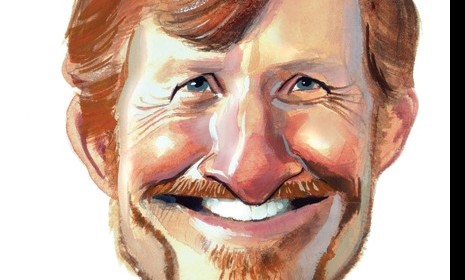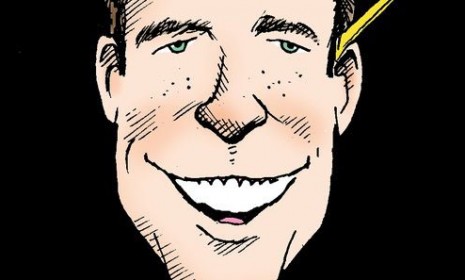Issue of the week: Was Goldman’s quarter too good?
Goldman Sachs reported record second-quarter earnings—an eye-popping $3.44 billion, or $4.93 a share, way past analysts’ consensus forecast of $3.54 a share.
A free daily email with the biggest news stories of the day – and the best features from TheWeek.com
You are now subscribed
Your newsletter sign-up was successful
The rest of America is waiting for the recovery to arrive, but at Goldman Sachs the good times are already back, said Graham Bowley and Jenny Anderson in The New York Times. The Wall Street investment bank this week reported record second-quarter earnings—an eye-popping $3.44 billion, or $4.93 a share, blowing past analysts’ consensus forecast of $3.54 a share. What may be even more startling is where those earnings came from: The best-performing units were Goldman’s fixed-income desk, which trades mortgages and other credit instruments, and its investment banking department, which underwrites issues of stocks and bonds. How did they do it? “Several of its rivals have gone out of business following the credit crisis,” making for less competition. The profit puts Goldman on track to pay out $18 billion in bonuses to its traders and bankers, which is sure to revive the controversy over Wall Street compensation practices.
That’s not the only cloud hanging over Goldman’s sparkling quarter, said Greg Farrell in the Financial Times. Along with news of the financial results came reports that firm executives sold $700 million of company stock “during the period in which the investment bank enjoyed the support of $10 billion from the federal Troubled Asset Relief Program.” That selling spree “is likely to draw criticism from lawmakers on Capitol Hill” who object to insiders profiting at the same time the firm was receiving government assistance. A Goldman spokesman would say only that many of the firm’s executives routinely sell shares in “an effort to diversify their holdings.”
In any case, the earnings numbers were less a gauge of Goldman’s trading proficiency, said Albert Bozzo in CNBC.com, than “a barometer of the government’s bailout of the financial system.” Goldman racked up those big profits because it was “borrowing money from Uncle Sam for virtually nothing” and then lending it out at a 3- to 4-percentage point markup. Even an idiot can make money with that kind of government subsidy. If, “after all of the support—direct and indirect,” Goldman was not doing well, then “we should be worried.”
The Week
Escape your echo chamber. Get the facts behind the news, plus analysis from multiple perspectives.

Sign up for The Week's Free Newsletters
From our morning news briefing to a weekly Good News Newsletter, get the best of The Week delivered directly to your inbox.
From our morning news briefing to a weekly Good News Newsletter, get the best of The Week delivered directly to your inbox.
What should really worry us, said Glenn Greenwald in Salon.com, is Goldman’s influence among Washington’s policymakers. Its former executives have flooded the upper reaches of the Federal Reserve and the Treasury Department, as well as President Obama’s economic brain trust. Its executives have showered millions of dollars in campaign contributions on congressional leaders of both parties. And of the $170 billion that the U.S. spent to rescue AIG, $13 billion actually flowed to Goldman, AIG’s biggest trading partner. “Is there anyone who would be willing to claim with a straight face” that Goldman’s second-quarter profits are unrelated to its access to power?
Goldman’s blowout quarter was “bound to fuel more conspiracy talk,” said Janet Whitman in Canada’s Financial Post. But there’s no need to reach for sinister theories to explain the firm’s performance. Goldman navigated the credit crisis more nimbly than its rivals did, leaving it poised to profit when markets regained their equilibrium. “This may just be an example of a firm that has followed a good business model all along,” says former Goldman executive Roy Smith, now a New York University finance professor. “Goldman has benefited from being a simpler, less complicated business than its competitors.”
A free daily email with the biggest news stories of the day – and the best features from TheWeek.com
-
 5 cinematic cartoons about Bezos betting big on 'Melania'
5 cinematic cartoons about Bezos betting big on 'Melania'Cartoons Artists take on a girlboss, a fetching newspaper, and more
-
 The fall of the generals: China’s military purge
The fall of the generals: China’s military purgeIn the Spotlight Xi Jinping’s extraordinary removal of senior general proves that no-one is safe from anti-corruption drive that has investigated millions
-
 Why the Gorton and Denton by-election is a ‘Frankenstein’s monster’
Why the Gorton and Denton by-election is a ‘Frankenstein’s monster’Talking Point Reform and the Greens have the Labour seat in their sights, but the constituency’s complex demographics make messaging tricky
-
Issue of the week: Who killed the Twinkie?
feature The seemingly imperishable Twinkie has finally met its match, and its name is Big Labor.
-
Issue of the week: Apple’s patent victory over Samsung
feature Apple's “sweeping victory” is among the biggest intellectual-property triumphs on record.
-
Issue of the week: Goldman Sachs’s ‘toxic’ culture
feature Greg Smith’s stinging public resignation from Goldman Sachs landed on Wall Street “like a bomb.”
-
Issue of the week: Can a mortgage deal revive housing?
feature Five big banks reached a settlement with state and federal officials to pay $26 billion to offset some of the damage caused by their misdeeds in the foreclosure crisis.
-
Issue of the week: Europe gets downgraded
feature Standard & Poor's lowered the credit rating for nine European nations, indicating that Europe has not yet convincingly dealt with the debt crisis.
-
 Tom Toles: Cartoonist of the Year
Tom Toles: Cartoonist of the Yearfeature Meet the winner of The Week's Cartoonist of the Year award
-
 Cartoonist of the Year finalists
Cartoonist of the Year finalistsfeature A brief look at this year's nominees
-
Issue of the week: Calling out the crash’s culprits
feature The Senate's Permanent Subcommittee on Investigations has just published its 635-page report on the financial crisis.